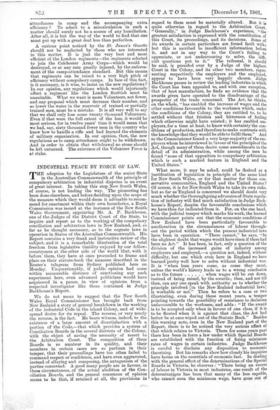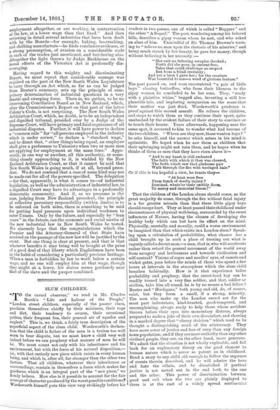INDUSTRIAL PEACE BY FORCE OF LAW. T HE adoption by the
Legislature of the senior State in the Australian Commonwealth of the principle of compulsory arbitration in industrial disputes is an event of great interest. In taking this step New South Wales, of course, is not leading the way. The pioneering has been done elsewhere, and before deciding upon the scope of the measure which they would deem it advisable to recom- mend for enactment within their own boundaries, a Royal Commission was issued at the instance of the New South Wales Government, appointing Mr. A. P. Backhouse, one of the Judges of the District Court of the State, to inquire and report as to the working of the compulsory conciliation and arbitration laws in New Zealand, and, so far as he thought necessary, as to the cognate laws in operation in States of the Australian Commonwealth. His Report contains a very frank and instructive review of the subject, and it is a remarkable illustration of the total freedom from legislative timidity enjoyed by our fellow- countrymen at the other side of the world that, with it before them, they have at once proceeded to frame and place on their statute-book the measure described in the Renter's telegram from Sydney published here on Monday. Unquestionably, if public opinion had come within measurable distance of sanctioning any such experiment here, even advanced politicians would have acquiesced in a pause, in view of opinions from a respected investigator like those contained in Judge Backhouse's Report.
We do not mean to suggest that the New South Wales Royal Commissioner has brought back from New Zealand a story of general breakdown in the working of the industrial Code in the island Colony, and of wide- spread desire for its repeal. The reverse, or very nearly the reverse, is the fact. He bears witness, indeed, to the existence of a large amount of dissatisfaction with a portion of the Code,—that which provides a system of Conciliation Boards in the several districts of the Colony, with the object of saving the necessity of resort to the Arbitration Court. The composition of these Boards is so amateur in its quality, and their members in certain cases are so partisan in their temper, that their proceedings have too often failed to command respect or confidence, and have even aggravated, instead of allaying and. composing, the antagonism of the parties concerned. A good many people are in favour, in these circumstances, of the actual abolition of the Con- ciliation Boards, and the general consensus of opinion seems to be that, if retained at all, the provisions in regard to them must be materially altered. But it la quite otherwise in regard to the Arbitration Court. "Generally," in Judge Backhouse's experience, "the . greatest satisfaction is expressed with the constitution of this Court, its proceedings, and its decisions. Some of its awards in certain particulars are found fault with; but this is ascribed to insufficient information before it, and not in any way to the Court's failing to appreciate, or not endeavouring to solve, the diffi- cult questions put to it." The tribunal, it should be said, is presided over by a Judge of the highest Court in the Colony, and its other two members, repre_ senting respectively the employers and the employed, appear to have been very happily chosen. Judge Backhouse passes in review the leading industries in which the Court has been appealed to, and with one exception, that of boot manufacture, he finds no evidence that the awards given have operated to the disadvantage of the prosperity of the trade concerned. The Act, he thinks, on the whole, "has enabled the increase of wages and the other conditions favourable to the workmen which, under the conditions of the Colony, they are entitled to, to be settled without that friction and bitterness of feeling which otherwise might have existed; it has enabled em- ployers, for a time at least, to know with certainty the con- ditions of production, and therefore to make contracts with the knowledge that they would be able to fulfil them." And so the Commissioner found a very large majority of the em- ployers whom he interviewed in favour of the prmcipleof the Act, though many of them desire some amendments in the detail of its administration, while among the men he found "none of that opposition to compulsory arbitration which is such a marked feature in England and the United States."
What more, it may be asked, could be desired as a justification of legislation in principle of the same kind for New South Wales, or for that matter for those con- servative communities, England and the United States? Of course, it is for New South Wales to take its own risks, but so far as "England is concerned we should doubt very much whether the thoroughgoing advocates of State regula- tion of industry will find much satisfaction in Judge Back- house's Report, despite the favourable conclusions which we have thus far indicated from it. For, on the one hand, with the judicial temper which marks his work, the learned Commissioner points out that the economic conditions of ew Zealand have been particularly favourable to amelioration in the circumstances of labour through- out the period within which the present industrial laws have been in operation. "There cannot," he says, "be the slightest doubt that wages would have risen if there had been no Act." It has been, in fact, only a question of the division of the increased gains of industry among employers and employed,—a question not, indeed, without difficulty, but one which even here in England we have learned pretty well how to solve without industrial war. It is "when lean years come, as come they must, unless the world's history leads us to a wrong conclusion as to the future when wages will be cut down, instead of being raised, by the awards; then, and not till then, can any one speak with authority as to whether the principle involved [in the New Zealand industrial laws] is workable or not." Then he refers to a case or two illustrating, even during these recent years, a ,temper pointing towards the possibility of resistance to decisions unfavourable to the workmen, and adds : "If the award is to be accepted only when in favour of one class, if it is to be flouted when it is against that class, the Act had better be at once wiped out of the Statute Book." Besides this warning note, even in the New Zealand part of the Report, there is to be noticed the very serious effect of that which relates to Victoria. There for some years past there has been in force a law under which Special Boards are established with the function of firing minimum rates of wages in certain industries. Judge Backhouse is careful to disclaim any disposition to economic theorising. But his remarks show how closely his inquiries have borne on the essentials of economic fact. In dealing with the general effect of the determinations of the Special Boards in Victoria, he observes : "There being an excess of labour in Victoria in most industries, one result of the determinagens has been that many of the less capable, who cannot' earn the minimum wage, have gone out of employment altogether, or are working, in contravention of the law, at a lower wage than that fixed." And then reviewing in detail several industries that have been dealt with by the Boards—for example, baking, bootmaking, and clothing manufacture—he finds conclusive evidence, or a strong presumption, of evasion on a considerable scale in each of the trades just mentioned, and butchering also. Altogether the light thrown by Judge Backhouse on the moral effects of the Victorian Act is profoundly dis- couraging.
Having regard to this weighty and discriminating Report, we must repeat that considerable courage was required on the part of the New South Wales Legislature to carry through an Act which, so far as can be judged from Reuter's summary, sets up the principle of com- pulsory determination of industrial questions in a very drastic and sweeping form. There is, we gather, to be no intervening Conciliation Board as in New Zealand, which, after the Commissioner's Report on that part of the latter Colony's Code, is not surprising. The New South Wales Arbitration Court, which, no doubt, is to be an independent and dignified tribunal, presided over by a Judge of the Supreme Court, will have primary and final cognisance of all industrial disputes. Further, it will have power to declare a "common rule" for "all persons employed in the industry which is under review," to declare a "standard wage," and to direct that, "other things being equal, an employer shall give a preference to Unionists when two or more men are applying for employment at the same time." Appa- rently, in one way or another, all this authority, or some- thing closely approaching to it, is wielded by the New Zealand Arbitration Court, so that it cannot be saidthat New South Wales is going much, if at all, beyond prece- dent. We do not contend that a case of some Lind may not be made out for all of the powers specified. The delegation —for that, apparently, is what it comes to—of industrial legislation, as well as the administration of industrial law, to a dignified Court may have its advantages in a profoundly democratic community. And if, as we presume is the case, judging from New Zealand precedent, the principle of collective pecuniary responsibility (within limits) is to be enforced on both sides, there is something to be said for putting legal pressure upon individual workmen to enter Unions. Only by the future, and especially by "lean rears" in the future, can the economic and social merits of the new industrial law in New South Wales be tested. We sincerely hope that the congratulations which the Premier and the Attorney-General of that State have received on the passage of the new law will be justified by the event. But one thing is clear at present, and that is that whatever benefits it may bring will be bought at the price of .a good deal of that liberty which Englishmen have been iuthe habit of considering a particularly precious heritage. When a man is forbidden by law to work below a certain wage, and no one will employ him at that wage, though they might at a lower, his status seems perilously near that of the slave and the pauper combined.















































 Previous page
Previous page